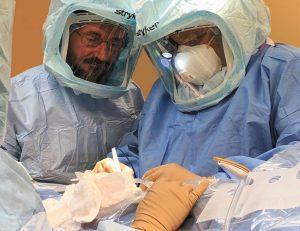 Total knee replacement became eligible for Medicare payment in the Ambulatory Surgery Center (ASC) setting in 2020, and Medicare added total hip replacements to its approved outpatient ASC list in 2021. Drs. J. Mandume Kerina and Thomas Hatton McCoy, orthopedic surgeons leading the UNOVA Hip & Knee Center in Lady Lake, Florida, are optimistic about this change and what it means for total joint replacement candidates. The team has developed several exclusive protocols that ensure “outpatient” truly means “outpatient” for their total joint replacement patients. These protocols have been developed over many years to improve outcomes for patients with minimal use of opioid pain killers both pre and post-operatively.
Total knee replacement became eligible for Medicare payment in the Ambulatory Surgery Center (ASC) setting in 2020, and Medicare added total hip replacements to its approved outpatient ASC list in 2021. Drs. J. Mandume Kerina and Thomas Hatton McCoy, orthopedic surgeons leading the UNOVA Hip & Knee Center in Lady Lake, Florida, are optimistic about this change and what it means for total joint replacement candidates. The team has developed several exclusive protocols that ensure “outpatient” truly means “outpatient” for their total joint replacement patients. These protocols have been developed over many years to improve outcomes for patients with minimal use of opioid pain killers both pre and post-operatively.
With the passage of Medicare’s new rules, many facilities offer “outpatient” total joint replacement to patients. Technically, the term “outpatient” can still include an overnight hospital stay. However, for 99.9% of Dr. Kerina and Dr. McCoy’s patients, “outpatient” means that they walk out and go home on the same day as surgery, ensuring true “outpatient” surgery. Additionally, their patients often recover without the use of prescription narcotic drugs, using only over-the-counter Extra-Strength Tylenol for pain relief.
“The opportunity for more Medicare patients to have access to total joint replacement surgery in an outpatient setting is an exciting development in our country’s efforts to provide more equitable healthcare,” said Dr. J. Mandume Kerina of UNOVA Hip & Knee Center. “Our Center’s approach to total joint replacement surgery is the result of years of analysis and listening to patients. Not every patient is the same, but every patient deserves the opportunity to live their life to the fullest,” he added.
A recent study in people with hip and knee osteoarthritis (Hawker GA, Croxford R, Bierman AS, et al.) revealed that a walking disability is associated with reduced life expectancy. Patients have an excess mortality risk as their disability progresses, and they become functionally dependent on medical therapy. In effect, a total hip replacement increases both the quantity and the quality of life by avoiding disease advancement.
Forward-thinking innovators dedicated to reimagining global health, Drs. Kerina and McCoy use a patient-centered, individualized, research-based approach in their work. By empowering patients and other practitioners to embrace outcomes-based healthcare, patients can spend less time in pain and experience much faster recovery than traditional in-patient total joint replacement patients.
“I think we will start seeing a larger percentage of total joint replacements performed in an outpatient setting. Outpatient joint replacement surgery tremendously increases the value of surgery as an option in the treatment of degenerative arthritis of the hip or knee,” said Dr. Thomas Hatton McCoy. “Over the past decade, tracking the outcomes of our outpatient total joint replacement patients, we have recorded a decrease in infection rate which is now less than 1 percent and an increase in
recovery speed.”
To learn more about outpatient total knee replacement and outpatient total hip replacement in an ambulatory surgery setting, contact the experts at UNOVA Hip & Knee. Call the Center at 352-973-4070 or fill out a form on www.UnovaHipAndKnee.com
 Central Florida Health and Wellness Magazine Health and Wellness Articles of the Villages
Central Florida Health and Wellness Magazine Health and Wellness Articles of the Villages



